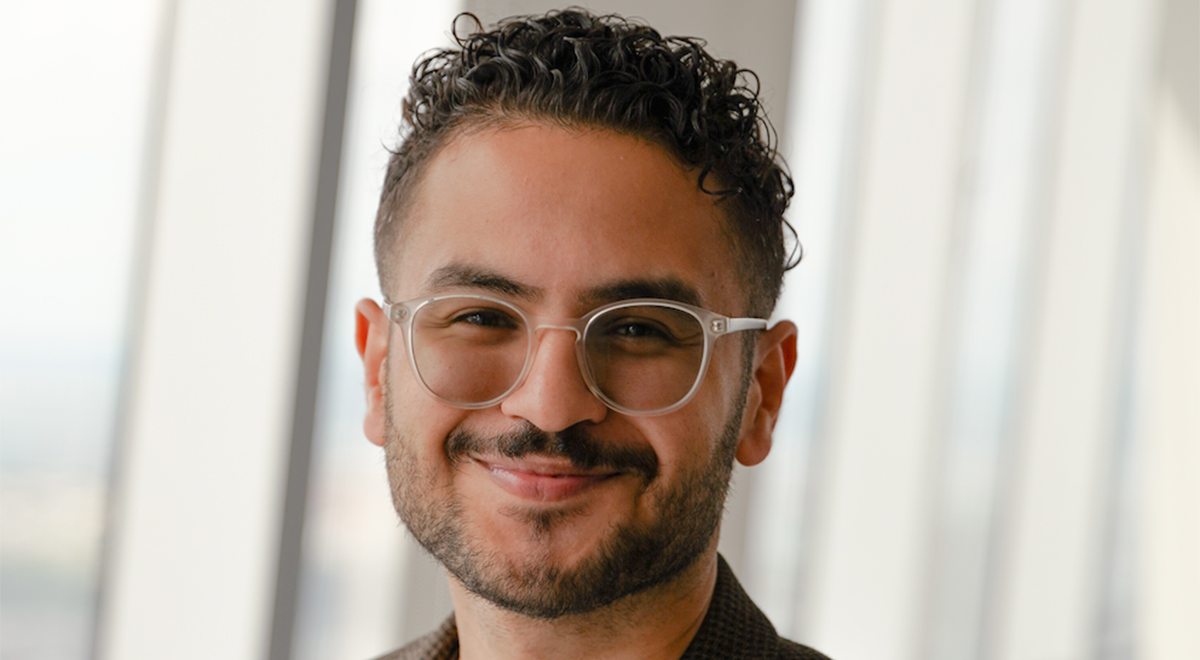Badr ’20 Named Director of the Patricelli Center

Poet and social entrepreneur Ahmed M. Badr ’20 has been named the new director of the Patricelli Center, an organization he considered a home while attending Wesleyan.
After serving in an interim capacity, Badr took on the permanent role in August. “I hope that the folks going through the classes and the program realize their own capacity to create a direct impact in the world,” Badr said.
Badr’s road to helping students find their way to change the world through the Patricelli Center began with finding his own voice.
His family came to the United States in 2008 as refugees from the war in Iraq and settled in South Dakota, moving to Texas shortly thereafter. In high school, Badr reflected on what happened. “I started to really think about what it means to be an Iraqi-American Muslim refugee and what it meant to claim those different identities and whether I could even claim all of them at once,” Badr said.
He began to write about his experiences in poems, short stories, and essays, posted on a blog. “I realized that people were really interested in my exploration,” he said. “After seeing the power of showing up with this kind of platform and saying, ‘this is who I am, this is who I am trying to be,’ I thought, why not make it something that’s available to other people?”
Badr created Narratio, a website where young people from displaced populations could share their perspectives. The site grew in popularity after he enrolled at Wesleyan, offering a place for stories to exist, to persist, and to change negative stereotypes, Badr said. Narratio won the Patricelli Center’s Seed Grant competition (now New Venture Awards).
Founding Narratio led to opportunities for Badr to share his storytelling expertise on larger stages, like the United Nations and the Nobel Prize Teacher’s Summit, connecting the importance of storytelling to climate change reform and other important global topics. Narratio evolved into a 501c3 organization, and now partners with the Metropolitan Museum of Art to run the only U.S. based storytelling and leadership Fellowship for resettled refugee youth. Over the past five years, work by its 80 Fellows has reached over 2.5 million individuals around the world.
After leaving Wesleyan with a degree in anthropology, Badr got a master’s in education from Harvard and sought ways to continue to help. Then the Patricelli position came along. “When the possibility of returning to Wesleyan came up, I was really excited because it brought together so many different worlds for me,” said Badr, praising his predecessor Makaela Kingsley, who he believes “built an amazing foundation for social impact.”
One of Badr’s goals for the upcoming year is to build the Center’s storytelling and community infrastructure. He built an online portal to all projects previously funded by the Patricelli Center, creating a location where students can browse previous ventures and their founders, and connect with funding opportunities and alumni. Over the past 12 years the Center has given out almost $600,000 dollars, funding almost 300 ventures. “That’s an important story to tell,” he said. The portal will be made available to the Wesleyan community later this semester.
This Fall Badr designed and launched “CSPL252: Leadership & Social Innovation”, a new course where students engage directly with 11 global leaders across fields, including diplomacy, climate action, journalism, and the arts. Over the summer, he interviewed each of these leaders and wrote case studies on their life and career journeys. Every week this semester, students engage with the case studies and meet these leaders during in-person class visits. They include Marc Pachter (Director Emeritus, National Portrait Gallery), Melissa Felming (Chief of Global Communications, United Nations), Bob Patricelli ‘61 (Philanthropist and Entrepreneur), Phoebe Boyer ‘89 (President & CEO, Children’s Aid NYC), and Jess Teutonico (Executive Director, We Are Family Foundation), among others.
The Patricelli Center is also focused on providing leadership experiences to Wesleyan students. Over the past eight months, PCSE students have played active roles in the United Nations ECOSOC Youth Forum, and recently the Center hosted its inaugural UN General Assembly event, the Proximate Leadership Forum.
These efforts are part of Ahmed’s continuing effort to give Wesleyan students direct access to leaders and leadership opportunities. “We are trying to strike a balance between the theory and the practice of social impact,” Badr said.
The Center wants to help students engage with global causes, and their own capacities to create impact, Badr said. “We must create opportunities for students to connect with social impact in ways that are multimodal, meaningful, and intentional.” Badr said.

